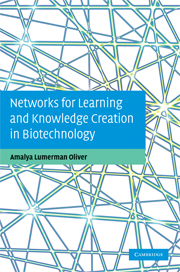Book contents
- Frontmatter
- Contents
- List of figures
- List of tables
- Acknowledgements
- Introduction
- 1 Networks, collaborations, and learning and knowledge creation
- 2 The biotechnology industry through the lenses of organizational and networks scholarship
- 3 New organizational forms for knowledge creation in biotechnology
- 4 Scientific entrepreneurship
- 5 Science and discoveries in the context of private and public knowledge creation and learning
- 6 The search for university–industry collaborations: linear and chaotic networking processes
- 7 Trust in collaborations and the social structure of academic research
- 8 Organizational learning and strategic alliances: recombination and duality of competition and collaboration
- 9 Further directions for understanding interorganizational collaborations and learning
- References
- Index
1 - Networks, collaborations, and learning and knowledge creation
Published online by Cambridge University Press: 04 July 2009
- Frontmatter
- Contents
- List of figures
- List of tables
- Acknowledgements
- Introduction
- 1 Networks, collaborations, and learning and knowledge creation
- 2 The biotechnology industry through the lenses of organizational and networks scholarship
- 3 New organizational forms for knowledge creation in biotechnology
- 4 Scientific entrepreneurship
- 5 Science and discoveries in the context of private and public knowledge creation and learning
- 6 The search for university–industry collaborations: linear and chaotic networking processes
- 7 Trust in collaborations and the social structure of academic research
- 8 Organizational learning and strategic alliances: recombination and duality of competition and collaboration
- 9 Further directions for understanding interorganizational collaborations and learning
- References
- Index
Summary
The primary goal of this chapter is to introduce the overarching framework of the book. It will start with the concepts of collaboration and learning. Then, we introduce the issue of levels of analysis, which is crucial for understanding the knowledge creation and learning processes within and between organizations. Specifically, the chapter will show how different levels of analyses – industry level, multiple interorganizational level, dyadic level, organizational level, and scientists' network levels – are crucial for understanding knowledge creation and learning in biotechnology. The aim here is to establish the analytic elements that will be used further in the book, and to illuminate the complexity involved in a framework based on multi-level and multi-unit analyses.
Networks of collaborations and learning
Science organizations are experiencing constant changes – in part due to environmental opportunities and constraints, which lead to adaptive changes, and owing to the changing nature of the scientific process in various scientific areas. For example, if science must advance through the joint research of large groups of scientists, as in the case of physicists working around a supercollider, the structure of the organization of the scientific work is expected to change. The structure of groups may change to incorporate large groups of scientists and multiple projects may emerge to accommodate the needs of experts who will seek other experts for learning collaborations. The flow of knowledge will be shaped and reshaped as the groups of scientists will continue to explore collaborations.
Information
- Type
- Chapter
- Information
- Publisher: Cambridge University PressPrint publication year: 2009
